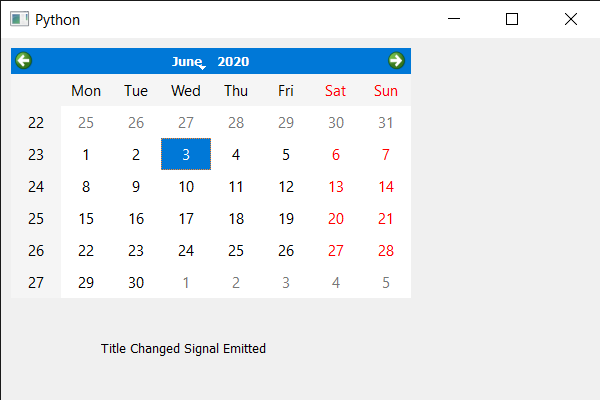En este artículo veremos cómo podemos obtener la señal de cambio de título del QCalendarWidget. La señal de cambio de título se emite cuando el título del calendario, es decir, la leyenda, ha cambiado. El título de configuración también emite la misma señal.
Para hacer esto, usaremos el método windowTitleChanged con el objeto QCalendarWidget.
Sintaxis: calendar.windowTitleChanged.connect(lambda: print(“Título cambiado”))
Argumento: No requiere argumento
Acción realizada: Imprimirá el mensaje cada vez que se emita una señal
A continuación se muestra la implementación.
Python3
# importing libraries
from PyQt5.QtWidgets import *
from PyQt5 import QtCore, QtGui
from PyQt5.QtGui import *
from PyQt5.QtCore import *
import sys
class Window(QMainWindow):
def __init__(self):
super().__init__()
# setting title
self.setWindowTitle("Python ")
# setting geometry
self.setGeometry(100, 100, 600, 400)
# calling method
self.UiComponents()
# showing all the widgets
self.show()
# method for components
def UiComponents(self):
# creating a QCalendarWidget object
calendar = QCalendarWidget(self)
# setting geometry to the calendar
calendar.setGeometry(10, 10, 400, 250)
# creating a label
label = QLabel(self)
# setting geometry to the label
label.setGeometry(100, 280, 250, 60)
# making label multi line
label.setWordWrap(True)
# text
text = "Title Changed Signal Emitted"
# getting the title changed signal and
# when receives the signal printing the message
calendar.windowTitleChanged.connect(lambda: label.setText(text))
# setting caption to the calendar
calendar.setWindowTitle("Title")
# create pyqt5 app
App = QApplication(sys.argv)
# create the instance of our Window
window = Window()
# start the app
sys.exit(App.exec())
Producción :

Publicación traducida automáticamente
Artículo escrito por rakshitarora y traducido por Barcelona Geeks. The original can be accessed here. Licence: CCBY-SA